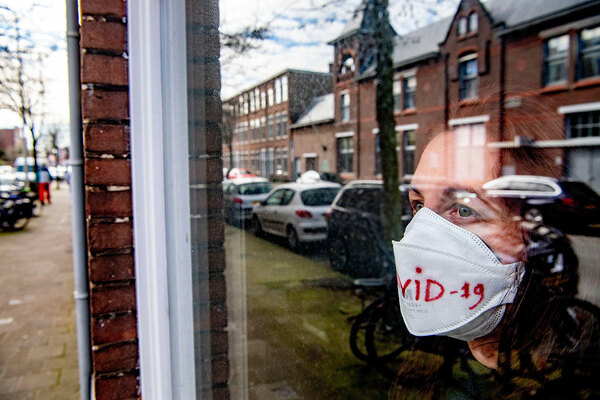You are viewing 1 of your 1 free articles
 Andrew Van Doorn
Andrew Van DoornAndrew is the Chief Executive of HACT. HACT partners with organisations across the housing sector to drive value for residents and ...more
Why taking a long-term view is still important during the coronavirus crisis
Housing associations are scrambling to deal with the fall-out from the COVID-19 pandemic. But one message Andrew van Doorn has picked up is: avoid acting like you are in constant crisis mode
We recently convened a Zoom meeting for community investment professionals to share their responses, concerns and challenges to the coronavirus crisis.
So I’d like to share some of the feedback from the meeting.
The immediate focus for most of those we’ve engaged with thus far has been on identifying and contacting their residents aged over 70 and have an existing health condition.
For many, this has been a Herculean task: one participant has more than 12,000 residents in this category. Another has 4,000, of whom they had already contacted 2,500 to make an initial assessment of levels of support needed.
The numbers involved are huge, and as a result organisations have been pulling in staff from other teams to work the phones. Some have been using scripts, along the lines of those used by fundraising centres, to ensure all staff talk to residents consistently.
Having triaged vulnerable customers and identified those with specific needs, organisations have been taking a number of different approaches to responding to those who need help.
One place-based organisation has been working closely with its local authority’s community hubs, passing on details of particularly vulnerable residents and co-ordinating responses.
The government has announced plans for similar hubs across the country. Information on these are still emerging, but there appears to be scope for co-ordinating activities alongside these wherever possible.
Others have been using the staff who have volunteered to go and deliver food and essential medicines. Another organisation has provided staff with the financial flexibility to buy shopping for residents, with their finance team setting up a unique code for them to reclaim these expenses.
For those organisations with stock spread over a wide area – one participant noted that they had stock in 180 different local authorities – there are a number of challenges involved in what to do next.
Who should they contact locally? Who else is working in that area? Who is co-ordinating the response? Our Community Insight tool provides some of these answers.
Partnership working, alongside the willingness to be flexible wherever possible, will clearly play a crucial role in both the short and medium term in alleviating this crisis.
“For those organisations with stock spread over a wide area, there are a number of challenges involved in what to do next”
One participant noted that local community groups were also facing capacity issues, whether because of resources or staffing. Another said they were fast-tracking grants to local community groups, while others were allowing any existing organisation in receipt of a grant to reassign it for use on COVID-19-related activities.
At the meeting there was also some thought about the role social housing organisations might play in the next phase of the crisis – using community centres for food distribution, for example.
The role of housing in being able to connect health services with vulnerable clients was also noted – this is something housing might offer to local GP surgeries to ensure that communications cut through to vulnerable groups.
Many organisations stated their concerns about the data protection implications of targeting vulnerable tenants for specific services, as well as the processes of sharing personal details to partner organisations. We let them know that the Information Commissioner’s Office have made it clear they understand that time, staff and finances are all under pressure at the moment and processes may have to temporarily adapt their usual practices to cope best.
It’s also worth noting that data can be processed and shared legitimately if it is in the vital interests of an individual – and given the seriousness of the coronavirus pandemic, it is safe to assume that applies across the board at the moment.
Where possible, do document your new processes and try as best you can to share that with those whose data you are processing.
However, do not do this at the expense of providing the required support as quickly as you can within your communities.
While most organisations are focusing primarily on vulnerable groups, they are also responding to other emerging needs of their residents.
A few noted that despite the uncertainty there has been a surge in job opportunities, particularly in retail, delivery and online fulfilment. Consequently, they have increased the numbers of staff working on their employment teams. Others have said that their employment teams were now working digitally and patchless.
Food poverty is a clear concern for many. The use of food vouchers, however, was seen as more complex. Instead, one participant said they had started sending out fuel vouchers as these were easier for people to use and for organisations to manage. The money residents saved on fuel could then be used on food.
“Where possible, do document your new processes and try as best you can to share that with those whose data you are processing”
Providing clear communications to residents, particularly around benefit entitlements and the government’s various announcements around support for individuals and businesses hit by the impact of coronavirus was another priority mentioned by several on the call.
Some organisations were increasing the numbers of staff in their benefits advice teams to support thousands of people who are concerned about their income and whether they’d be entitled to sick pay.
This echoes the data released by Citizens Advice recently, which shows the top 10 issues people had been searching for on their website over the past week.
Many organisations are also looking at how they can provide hardship funds to residents, although this might be something that takes a back seat while they deal with more immediate short-term issues.
The meeting demonstrated the flexibility and speed of many social housing organisations in responding to the crisis on their doorsteps, as well as the critical role community investment professionals are playing. They are stepping up to work with partners to signpost to services and to utilise the existing relationships they have with residents and community organisations.
One resounding final message, from one participant: we have to keep taking the long view and not act as if we’re in crisis mode the whole time. Otherwise we won’t be able to provide the services and support that thousands of our residents need now, and in the future.
Andrew van Doorn, chief executive, HACT
More on coronavirus
To see all our coronavirus coverage to date – including the latest news, advice to providers, comment and analysis – use the link below.
Sign up for our daily newsletter
Already have an account? Click here to manage your newsletters














